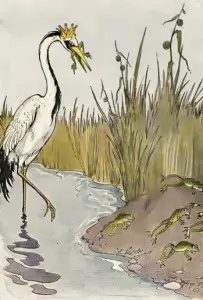The Frogs Desiring a King (from the Fables of Aesop)

Դժգոհ մարդու ինչ որ ընեն,
Միշտ կը գանգատի ունեցածէն։
Գորտերը կը ձանձրանան անանկ
Դիոս մեր գրոց մէջ Արամազդ կ’ըսուի, որ կռապաշտութեան ատենը երկնից մեծ աստուած կը կոչուէր. որչափ աղէկութիւն որ կ’ըլլայ բոլորը Դիոս կու տայ կ’ըսէին. անոր համար գորտերն ալ ասոր կ’աղաչեն որ իրենց թագաւոր տայ. ուստի երբոր գորտերը գիշերանց կը պօռան՝ հիները կ’ըսէին թէ իրենց թագաւորէն գանգատ կ’ընեն Դիոսին։ Օրինակ է գանգատ ընողներուն. որ ի՛նչ ընես կը տրտնջան, եւ Աստուծոյ շնորհակալ չեն ըլլար. անոր համար գէշ կ’ըլլայ իրենց բանը։
The Frogs, living an easy free life every where among the lakes and ponds, assembled together, one day, in a very tumultuous manner, and petitioned Jupiter to let them have a King, who might inspect their morals, and make them live a little honester. Jupiter, being at that time in pretty good humour, was pleased to laugh heartily at their ridiculous request; and, throwing a little log down into the pool, cried, 'There is a King for you.' The sudden splash which this made by its fall into the water, at first terrified them so exceedingly, that they were afraid to come near it. But in a little time, seeing it lay still without moving, they ventured, by degrees, to approach it; and at last, finding there was no danger, they leaped upon it; and, in short, treated it as familiarly as they pleased. But not contented with so insipid a King as this was, they sent their deputies to petition again for another sort of one; for this they neither did nor could like. Upon that he sent them a Stork, who, without any ceremony, fell a devouring and eating them up, one after another, as fast as he could. Then they applied themselves privately to Mercury, and got him to speak to Jupiter in their behalf, that he would be so good as to bless them again with another King, or to restore them to their former state. 'No,' says he, 'since it was their own choice, let the obstinate wretches suffer the punishment due to their folly.'
It is pretty extraordinary to find a fable of this kind finished with so bold and yet polite a turn by Phaedrus: one who attained his freedom by the favour of Augustus, and wrote it in the time of Tiberius; who were, successively, tyrannical usurpers of the Roman government. If we may take his word for it, Aesop spoke it upon this occasion. When the commonwealth of Athens flourished under good wholesome laws of its own enacting, they relied so much upon the security of their liberty, that they negligently suffered it to run out into licentiousness. And factions happening to be fomented among them by designing people, much about the same time, Pisistratus took that opportunity to make himself master of their citadel and liberties both together. The Athenians finding themselves in a slate of slavery, though their tyrant happened to be a very merciful one, yet could not bear the thoughts of it; so that Aesop, where there was no remedy, prescribes to them patience, by the example of the foregoing fable; and adds, at last, 'Wherefore, my dear countrymen, be contented with your present condition, bad as it is, for fear a change should be worse.'


Comments
Post a Comment